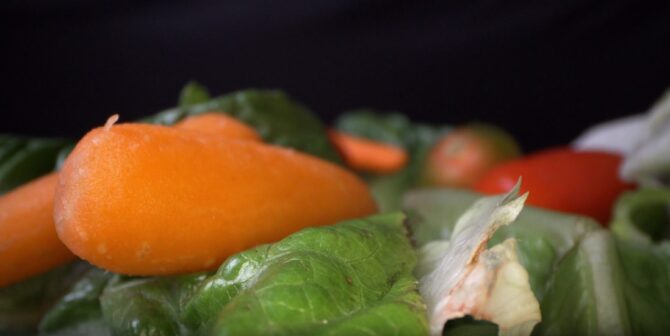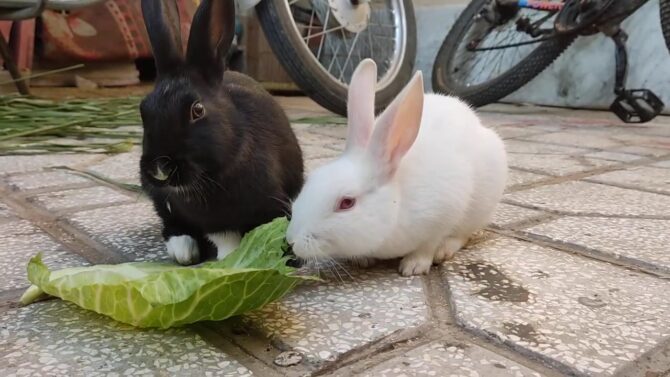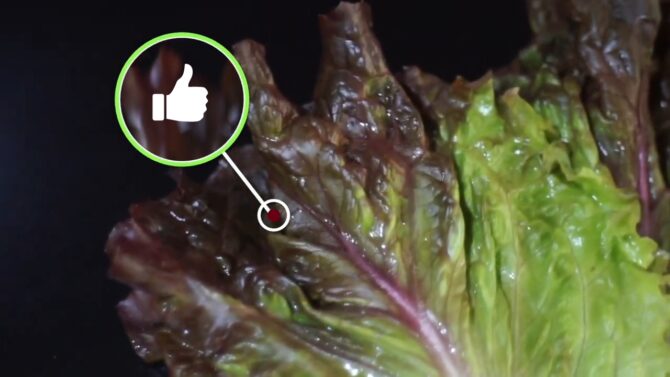I remember the first time I brought home my little fluff ball, Luna. Like any new pet parent, I was eager to give her the best of everything, especially when it came to her diet.
I’d often find myself standing in the produce section of the grocery store, wondering, “Can Luna eat this?” One vegetable that always puzzled me was cabbage.
So, I decided to explore and find out everything there is to know about rabbits and cabbage.
The Basics of a Rabbit’s Diet

Rabbits are herbivores, which means they primarily consume plant-based foods. Their diet mainly consists of hay, vegetables, and some fruits. But not all greens are safe for them.
They ha, one of the friendliest animals, have a unique digestive system that requires a constant intake of fiber to function correctly. Hay, particularly timothy hay, is the primary source of this fiber. It helps in the digestion process and prevents gastrointestinal problems.
While understanding the dietary needs of rabbits is crucial, it’s equally fascinating to delve into their unique reproductive behaviors, shedding light on questions like whether female rabbits have periods.
Fruits and vegetables, on the other hand, are like treats for bunnies. They should be given in moderation. While they provide essential vitamins and minerals, too much can lead to health issues.
The Importance of Variety
Just like humans, rabbits also enjoy a varied diet. Offering a mix of different vegetables ensures they get a range of nutrients. However, it’s crucial to introduce new foods slowly to avoid upsetting their stomachs.
Rotating between different types of greens and occasionally adding fruits can make mealtime exciting for bunnies. But always remember to check if a particular food is safe for them before introducing it.
Can Rabbits Eat Cabbage Safely?

Yes, rabbits can eat cabbage, but with some caveats. Some might tolerate this vegetable well, while others might not. It’s essential to introduce it slowly into their diet and observe for any signs of digestive upset.
It’s also crucial to ensure that the cabbage is fresh and free from pesticides. Always wash it thoroughly before offering it to your bunny.
Nutritional Value
Cabbage is packed with vitamins and minerals. It’s a good source of Vitamin K, Vitamin C, and dietary fiber. These nutrients can be beneficial for rabbits when given in the right amounts.
However, it also contains goitrogens, which can interfere with thyroid function. While this is rarely an issue for humans, bunnies might be more sensitive to these compounds.
Tips for Introducing New Foods
Introducing new foods to your bunny’s diet can be a delicate process. Here are some guidelines to ensure a smooth transition.
1. One at a Time
When introducing a new vegetable or fruit to your rabbit, it’s essential to do it one at a time. This approach allows you to monitor their reaction and determine if a particular food causes any digestive upset or allergies.
If you introduce multiple new foods simultaneously and your rabbit has an adverse reaction, it will be challenging to pinpoint the culprit. Start with a small amount of the new food and gradually increase the quantity over several days.
This slow introduction gives your rabbit’s digestive system time to adjust. If you notice any signs of discomfort or changes in their droppings, it might be best to stop the new food and consult with a veterinarian.
2. Pay Attention to Types of Cabbage and Their Effects
There are various types of cabbage, like green, red, and savoy. While all these types are generally safe for rabbits, some might cause more gas than others. Gas can be uncomfortable for them, so it’s essential to monitor them after feeding.
Red cabbage, for instance, tends to be higher in goitrogens than the green one. So, it might be best to stick to green cabbage or rotate between different types to see which one your rabbit prefers.
Common Misconceptions
When it comes to feeding rabbits, many myths and misconceptions abound. Let’s debunk some of the most common ones related to vegetables, especially cabbage.
All Vegetables are Safe for Rabbits
This is a widespread misconception. While rabbits are herbivores and thrive on a plant-based diet, not all vegetables are safe for them.
Some, like iceberg lettuce, can be watery and offer little nutritional value, while others might contain harmful compounds. Always research a particular vegetable before introducing it to your rabbit’s diet.
And remember, even safe vegetables should be introduced slowly and given in moderation.
Cabbage Causes Bloat in All Rabbits
While it’s true that some bunnies might experience gas or bloating after consuming this vegetable, it doesn’t mean all rabbits will. Each rabbit is unique, and their tolerance to different foods can vary.
If you notice your rabbit experiencing discomfort after eating cabbage, it might be best to avoid it in the future. However, many rabbits enjoy this vegetable without any issues.
Alternatives to Cabbage

If you’re hesitant about feeding cabbage to your rabbit or if they don’t seem to like it, there are plenty of other vegetables to consider.
Leafy Greens to Consider
Leafy greens like kale, romaine lettuce, arugula, and spinach are excellent choices for rabbits. They’re packed with nutrients and can be a delicious treat for your bunny.
However, as with all foods, it’s essential to introduce them slowly and ensure they’re fresh and free from pesticides.
Vegetables to Avoid
While many vegetables are safe for rabbits, some should be avoided. These include potatoes, rhubarb, and most beans. These foods can be toxic to bunnies and cause severe health issues.
Always consult with a veterinarian or rabbit expert if you’re unsure about a particular vegetable.
FAQs
Are there any specific cabbage parts that are safer or more nutritious for rabbits?
The leafy parts of the cabbage are generally safe and nutritious. However, it’s best to avoid feeding the hard stem or core, as it can be more challenging for them to digest and might pose a choking hazard.
Can baby rabbits eat cabbage?
Baby rabbits, or kits, have a more sensitive digestive system than adults. It’s best to stick to alfalfa hay and specially formulated rabbit pellets for the first few months.
Introduce vegetables like cabbage only when they’re older and their digestive system is more mature, typically around 12 weeks.
How should I store cabbage to ensure it remains fresh for my rabbi?
Store it in the vegetable crisper drawer of your refrigerator. Ensure it’s kept away from fruits that release ethylene gas, like apples, as this can cause the vegetable to spoil faster.
Before feeding, wash it thoroughly to remove any pesticides or contaminants.
My rabbit didn’t like cabbage the first time. Should I try again?
Animals, like humans, have individual preferences. If your bunny didn’t show interest in this vegetable the first time, you can try again after a few days.
However, if they consistently avoid it, it’s best to offer other vegetables they might prefer.
Can I mix cabbage with other vegetables when feeding my rabbit?
Yes, you can mix it with other rabbit-safe vegetables to provide variety. However, when introducing it for the first time, it’s best to offer it alone. This way, if your pet has an adverse reaction, you’ll know the cause.
The Bottom Line
Well, there we have it! I hope this guide has shed some light on the great cabbage debate for all of you. Luna and I have had our fair share of trial and error when it comes to her diet, and I’ve learned that every bunny is unique.
Whether your furry friend is a fan of this vegetable or prefers to nibble on other greens, the key is always to be observant and prioritize their well-being.
Happy feeding, and give your bunny an extra carrot (or cabbage leaf) from Luna and me!

